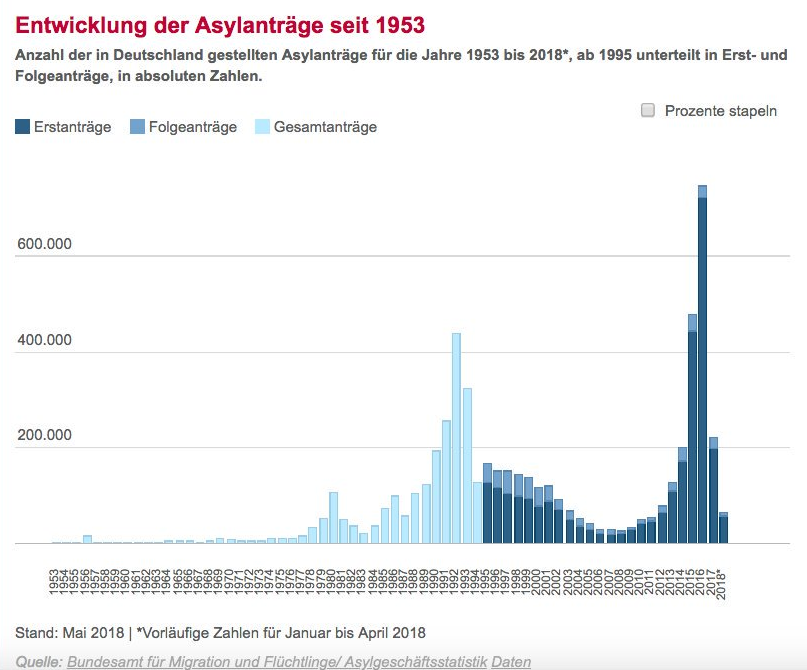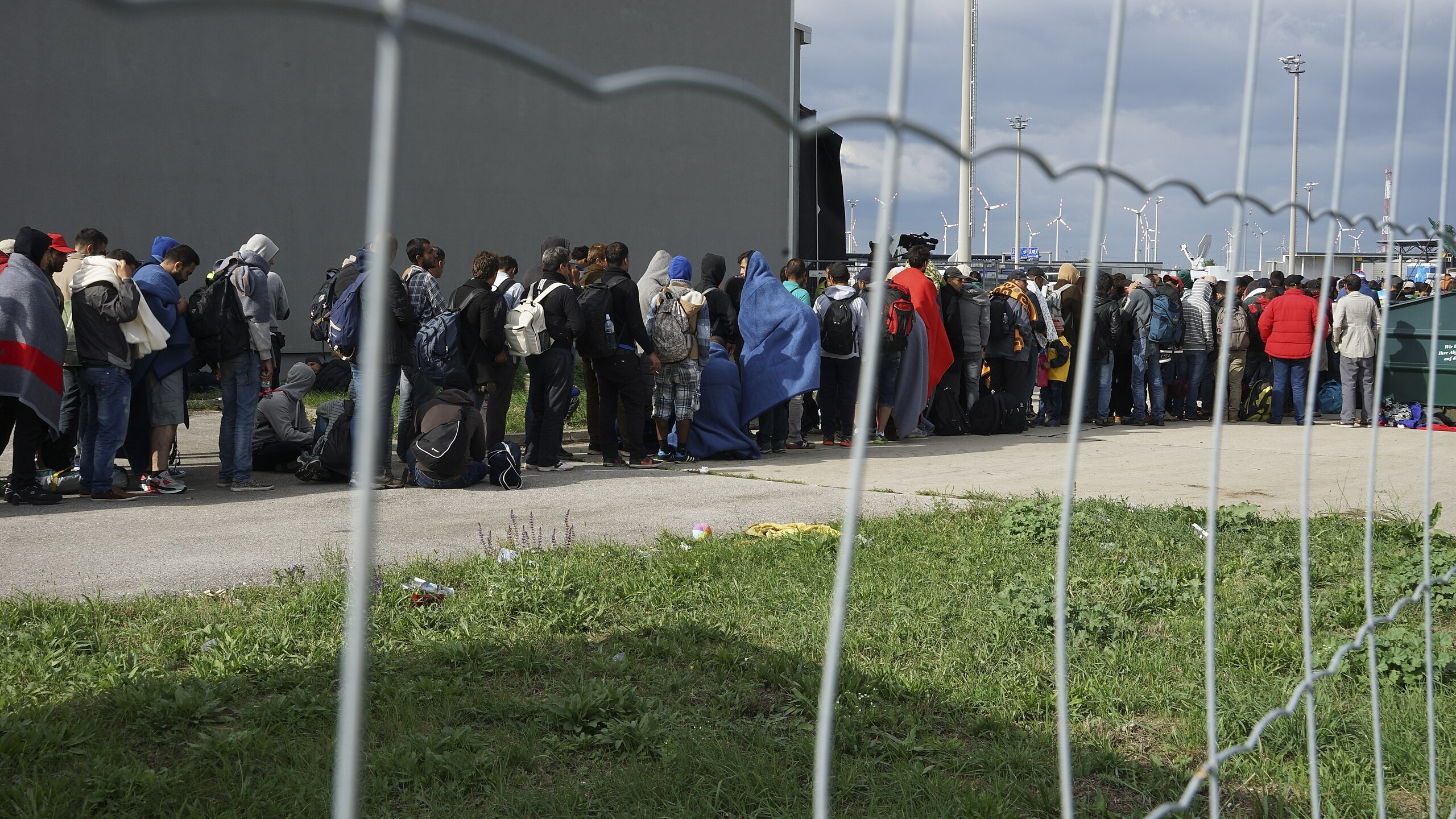Since 2016, led by centrist and far-right parties, European migration policies have shifted to the right. What role can pro-immigration left groups play in changing this reactionary wave?
Death has always been a central catalyst in the migration debates in Europe. When Aylan Kurdi’s body washed ashore on 2 September 2015, it led to a humanitarian outcry across Europe leading some states of the European Union under the direction of Chancellor Angela Merkel, to open their doors to refugees. What propelled the solidarity movement of 2015 across the German political spectrum, was a wave of sympathy against the massive graveyard that was accumulating on the Mediterranean Sea. During the height of the ‘crisis’ in 2015, pro-immigration activists in Germany held anti-Nazi and pro-migrant demonstrations with pro-refugee punk music topping the charts.
In more recent years, European migration policies have been mostly decided by centrist and far-right parties. Since 2016, public consciousness and policy has shifted to the right especially as the European Union (EU) is putting forth legislation to further militarise its external borders, set up immigration centers outside of Europe, and prevent migrants from moving within Europe.
Yet, social movements and Leftist parties can provide the political space to counteract this growing reactionary mood. This has been particularly effective in southern Europe where pro-immigration groups have challenged anti-migration policies. In Spain, Proactiva Open Arms, an immigration rights group, led an action to commemorate the migrants that have drowned at sea. In an interview with Democracy Now, Mar Sebe, a member of this group, remarked:
We decided to make this action to spread the word, to tell the people what’s happening and to tell the people that all human rights are on stage right now, and we have to really go out and defend.
This action has been especially important given that ships carrying migrants have been turned away, especially in Italy. At the same time, the rise of the far right and the failure of the left to win pro-migrant demands, has led to a strained political climate in Germany.

Identified in the chart above, which shows the rate of asylum applications Germany since 1953, migration has fallen rapidly since 2015. However, immigration continues to be a central concern in German and EU politics. The German government and the general public have undergone a host of responses, with pro-immigrant leftists often being excluded from mainstream discourse. What’s at the heart of the electoral and migration “crisis” is that centrists—from the Christian parties in Germany—is their concession to the anti-immigrant populism of the far right, thus resulting in a retreat to anti-immigrant populist sentiments. The Washington Post has recently argued that the number of asylum seekers in the EU has decreased to pre-2015 levels.
On the one hand, this suggests that there are fewer people entering the EU, but what this does not account for is the ways that non-European states, notably at EU insistence, are preemptively preventing migration from even occurring. These policies include, but are not limited to, Turkey averting migration to Europe and the Tunisian government and Libyan Coastguard cooperating with Europe’s border patrol. These policies reflect the gap that has opened up for left social movements to cohere and make demands that not only speak to migration within the limited realms of nation-states but the necessity to think about this issue more broadly and to wage more effective international campaigns. At the same time, the shift in policies from 2015 to 2018 is also a reflection of the shift to the far right within the EU.
The new EU migration proposals are being hailed as unclear by critics. The new EU policy wants to send refugees to other EU countries if they have previously registered in those states, which has resulted in some European countries further sharpening their anti-immigrant sentiments, for example leading the Austrian government indicating that it will “protect its borders”. In Hungary, the Prime Minister Viktor Orban led a legislative campaign that criminalises groups and individuals who provide assistance to migrants with the possibility of a one-year prison sentence if convicted. They want to condemn boats rescuing migrants from the Mediterranean Sea. These laws have not emerged in isolation, but reflect a wider political shift in where European leaders have used their power to detain migrants and berate them.
In Germany, the Alternative für Deutschland (AfD), Alice Weidel, its co-leader, recently made a speech to the German parliament where she vilifies Muslims and characterizes other immigrants as “criminals.” The AfD has pushed the conversation about migration to the right within German politics to the point that some German provinces have voted to refuse migrants from coming to their region, which follows in the way some Eastern European states have refused to take in refugees during the height of 2015 crisis.
At the same time, the far right’s mobilization has also had an impact on German consciousness. In May 2018, 7,000 AfD members marched in Berlin, with speeches that blamed migrants and refugees for a host of structural issues. Center-right parties such as the Christian Democratic Union (Merkel’s Party) and the Christian Social Union (Bavaria, Horst Seehofer, Ministry of Interior’s party) have been part of a coalition that has been losing popularity, with a 1.9 drop in Bavaria in a province that has had a 2.4 increase in AfD support .
An important question to note is why the AfD has been able to make some gains. For one, they have been able to acquire votes that were traditionally won by leftist and social democratic voters who went for Die Linke (the Left Party) and the Social Democratic Party, respectively. In addition, the AfD has aligned themselves with the German anti-Islam group, Patriotic Europeans Against the Islamisation of the West, otherwise known as Pegida. Outside of parliament, far-right and xenophobic attitudes have had ideological and material consequences with debates happening over the past decade. In Germany, anti-migrant attitudes have been increasing since 2011, where the representation of non-white and non-Christian migrants have been chastised in popular culture. At the same time, the Council of Europe reported that there was a rise in xenophobic populism and hate speech, with some neo-Nazi groups in Berlin surfacing in leftist neighborhoods.
The German parliamentary left is split on the issue of immigration and, in some cases, taking a centrist perspective especially with respect to people who come from the Middle East and North Africa. One faction of the Die Linke has had debates concerning migration, with a comprehensive migration program that calls for open borders, restoring asylum rights, removing internment centers for migrants, funding for maritime rescue, and more. Similarly, the German Green Party is pro-migration but has not been able to yield this into policy change. There are various grassroots pro-immigration/open borders groups calling for Sanctuary Cities in Germany, but they do not have the same impact and reach.
The death of migrants in the Mediterranean Sea has re-emerged as a galvanising force for activists in Germany, with people being outraged by the more than 1,000 deaths since January 2018. The Italian government’s refusal of ships carrying refugees has caused further outrage, leading 12,000 activists to demonstrate on Saturday, 7 July 2018, in central Berlin. They demanded the safe passage of migrants into Europe, an open border and solidarity cities. They want to stop criminalizing migrants and to provide aid, not create humanitarian catastrophe.
The task of the Left, moving forward, is to learn from movements that have been able to challenge and deter the far-right presence. For example, in Spain the far right has been kept to the fringe of mainstream politics, where the memory of the former fascist dictator, Francisco Franco, still looms over the country. In addition, Leftist groups and parties should consider ways to combat the rise in neo-Nazi groups and hate crimes against migrants who settle in Europe.
Left social movements are fighting against the monolith of center-liberal and right-wing parties who seek to limit immigration to Europe. Those with power are able to present a xenophobic platform that glorifies “Fortress Europe.” If these movements grow and shift political conscious to the left, this will require a number of political strategies including but not limited to direct actions, protests, and parliamentary shifts.
The death of migrants in the Mediterranean Sea has been a motivation for people to act, but sympathy in itself will not prevent this from happening. The growth of an anti-racist and pro-immigrant Left will be a central feature of putting lives first, one that extends human solidarity. This also means thinking within an internationalist perspective that challenges what always was an international border regime.
